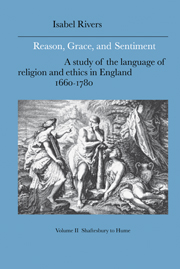Book contents
- Frontmatter
- Contents
- Preface
- Abbreviations
- Introduction
- 1 The true religion of nature: the freethinkers and their opponents
- 2 Shaftesbury and the defence of natural affection
- 3 Defining the moral faculty: Hutcheson, Butler, and Price
- 4 The ethics of sentiment and the religious hypothesis: Hume and his critics
- 5 The conflict of languages in the later eighteenth century
- Bibliography
- Index
5 - The conflict of languages in the later eighteenth century
Published online by Cambridge University Press: 15 December 2009
- Frontmatter
- Contents
- Preface
- Abbreviations
- Introduction
- 1 The true religion of nature: the freethinkers and their opponents
- 2 Shaftesbury and the defence of natural affection
- 3 Defining the moral faculty: Hutcheson, Butler, and Price
- 4 The ethics of sentiment and the religious hypothesis: Hume and his critics
- 5 The conflict of languages in the later eighteenth century
- Bibliography
- Index
Summary
THE TIME will come, my Lord, and I even assure myself it is at no great distance, when the Universities of England will be as respectable, for the learning they teach, the principles they instil, and the morals they inculcate, as they are now contemptible, in your Lordship's eye at least, on these several accounts.
I SEE the Day, when a scholastic theology shall give place to a rational Divinity, conducted on the principles of sound criticism and well-interpreted Scripture: When their Sums and Systems shall fly before enlightened Reason and sober Speculation … When their Physics shall be Fact; their Metaphysics, common sense; and their Ethics, human nature.
‘Locke’ to ‘Shaftesbury’, in Hurd, Dialogues on the Uses of Foreign Travel (1764), 192–3reason has impertinently intermeddled with the Gospel, and that with such overbearing sedulity, as to darken it more and more; and rivers of tears would not suffice to bewail the increase of moral misery, which, since Mr. Locke's time, has pervaded these kingdoms.
Milner, Gibbon's Account of Christianity Considered (1781), 156the aera is approaching very fast, when Theological Acrimony shall be swallowed up in Evangelical Charity, and a liberal toleration become the distinguishing feature of every church in Christendom. The ruling powers in Protestant and Catholic states begin at length every where to perceive, that an uniformity of sentiment in matters of religion is a circumstance impossible to be obtained; that it has never yet existed in the church of Christ, from the Apostolic age to our own.
Watson, Collection of Theological Tracts (1785), I, xviii- Type
- Chapter
- Information
- Reason, Grace, and SentimentA Study of the Language of Religion and Ethics in England, 1660–1780, pp. 330 - 356Publisher: Cambridge University PressPrint publication year: 2000

